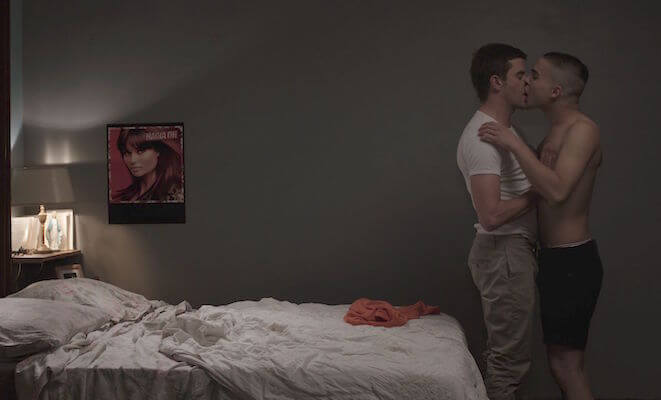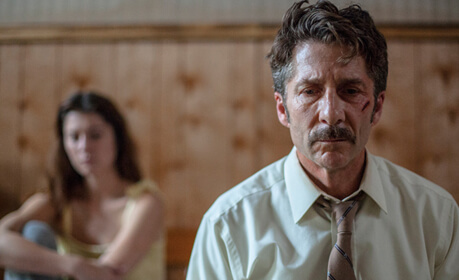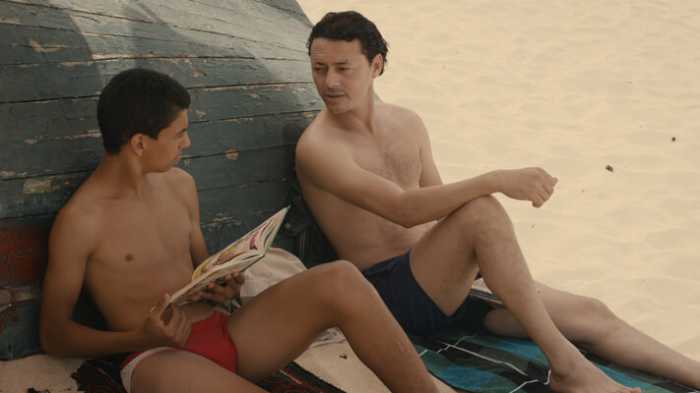STEVE ERICKSON | Benjamin Crotty is an American director working in France, although he plans to make his next film back home. He took most of the dialogue for his debut feature, “Fort Buchanan,” from American TV, although he’s been reticent to spell out his exact sources. However, he has cited the cable show “Army Wives” as an inspiration; perhaps as a consequence, the Film Society of Lincoln Center’s program notes describe “Fort Buchanan” as a “queer soap opera.”
“Fort Buchanan” is set on a US Army base in France. The spouses live in cabins on the base, and none of them seems to work. Roger (Andy Gillet) lives with his 18-year-old daughter, Roxy (Iliana Zabeth), although he doesn’t look old enough to have fathered — or even adopted — a young adult. He pines for his husband, Frank (David Baiot), serving in Djibouti, a tiny country in the Horn of Africa. The wives all seem to be bisexual and pass the time flirting with each other and Roxy, something Roger doesn’t seem to mind. They all go to Djibouti in the film’s second third, but Frank seems distant and Roger doesn’t know how to reignite the couple’s sex life.
Most attempts to infuse pop culture with a gay perspective wind up dreadfully dull and compromised: think of the music of Sam Smith or the films “Philadelphia” and “Freeheld.” They bring to mind Leonard Cohen’s line “they sentenced me to 50 years of boredom for trying to change the system from within.”
However, Crotty is doing something different. He’s not exactly critiquing pop culture, but he’s trying to suggest what it might be like if soap operas dealt with homo- and bisexuality as the norm. “Fort Buchanan” takes place in a world where almost everyone has the potential to sleep with a member of the same sex, even if they’re married to someone of the opposite sex. It’s the cinematic equivalent of Charles Stross’ science fiction novel “Rule 34,” in which all the lead characters are lesbian, gay, or bisexual and no one calls attention to this or finds it odd.
The military has long been fetishized by gay male culture, and I suppose “Fort Buchanan” takes part in this tradition to some extent. But while Frank is conventionally macho, Andy Gillet brings a certain feyness to the part of Roger. He may be best known for his role in Eric Rohmer’s “The Romance of Astrea and Celadon,” in which he played an androgynous character who was mistaken for a woman. Even when Roger grows a beard late in the film, he’s not exactly butch.
“Fort Buchanan” spends far more time on the people left behind by the military than soldiers themselves. Most of them are women, which helps subvert clichés about the army. This isn’t a Tom of Finland drawing come to life. It’s not even similar to Claire Denis’ homoerotic take on military life, “Beau Travail.”
“Fort Buchanan” plays the Film Society of Lincoln Center as part of a series called “ Friends with Benefits: An Anthology of Four New American Filmmakers.” It includes shorts by Alexander Carver, Daniel Schmidt, Crotty and Gabriel Abrantes, as well as Schmidt and Carver’s 2013 feature “The Unity of All Things.” One can see the roots of “Fort Buchanan” in Abrantes and Crotty’s very first short, “Visionary Iraq,” in which the white male directors play all the roles (including an Angolan girl). There’s a love there for politically incorrect play with gender and race that got smoothed out by the time Crotty made “Fort Buchanan” and was able to cast actual women and people of color. Still, Abrantes and Crotty’s drag show offers up the same fascination with the military, along with a more overt skepticism about its supposed benevolence.
Abrantes and Crotty’s follow-up short, “Liberdade,” shows an engagement with real Angolans and adopts a more sober, melancholy tone than either “Visionary Iraq” or “Fort Buchanan.” An element of childlike playfulness, drawn from ‘60s American avant-garde directors like Jack Smith and the Kuchar brothers, remains in “Fort Buchanan,” particularly in its first 20 minutes. But “Fort Buchanan” is more mature: it begins with love and ends with disillusionment and death. As Crotty’s work evolves, I hope it retains the same playful quality and gentle iconoclasm.
FORT BUCHANAN |Directed by Benjamin Crotty | Self-distributed | In French with English subtitles | Film Society of Lincoln Center, Howard Gilman Theater | 144 W. 65th St. | Feb. 5-11 | $14; $9 for students & seniors at filmlinc.org
Benjamin Crotty appears at the Feb. 6, 7 p.m. and Feb. 7, 6 p.m. screenings of “Fort Buchanan,” and, with Gabriel Abrantes, at the Feb. 6, 4:30 p.m. screening of “Visionary Iraq.”



































